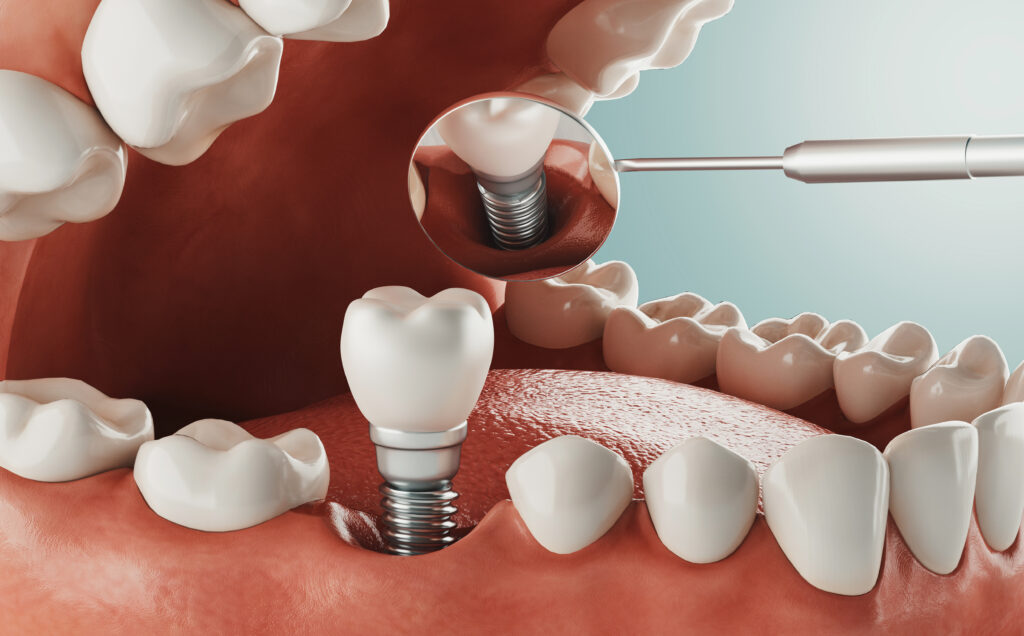

How Do Dental Implants Work?
Dental implants are a groundbreaking solution in dentistry, effectively replacing missing teeth. Made from biocompatible materials like titanium, they provide a sturdy base for artificial teeth, closely mimicking natural tooth roots.
In this guide, we’ll explore the world of dental implants – what they are, why they matter, the procedure involved, the different types available, and their advantages.
We’ll also touch on how to care for them, potential risks, and costs. This article is your one-stop resource to understand why dental implants have become a preferred dental solution for many people worldwide.
What are dental implants?
Dental implants are innovative marvels in dentistry that serve as a highly functional substitute for missing teeth. They are surgical fixtures made from biocompatible materials like titanium placed into the jawbone.
These implants eventually integrate with the bone, much like a natural tooth root. This procedure creates a solid base robust enough to support one or more artificial teeth, commonly called crowns.
The concept of dental implants is not new; it has been around since ancient times but has improved dramatically with the advent of modern dentistry.
The importance of dental implants
Dental implants have emerged as a game-changer in dental care, making it feasible to replace a single tooth, multiple teeth, or all teeth. They provide superior structural support and longevity compared to traditional dental bridges or dentures.
They also help maintain facial structure, preventing bone loss in the jaw, thereby providing both functional and aesthetic benefits.
The dental implant procedure
Consultation and planning
The journey toward a dental implant begins with an initial visit to a dental expert. During this consultation, the dental expert evaluates the patient’s oral health, conducts a comprehensive mouth examination, and takes necessary X-rays or 3D images.
This helps assess the jawbone’s condition, a crucial factor for a successful implant. The dentist also discusses the different implant options and the entire process to ensure the patient makes an informed decision.
Initial placement
The dental implant procedure is a multi-stage process. Initially, under local anesthesia, the dentist makes a small incision into the gum to expose the bone where the implant will be placed. A hole is then drilled into the bone, and the implant is inserted.
Healing and osseointegration
After the implant placement, the healing phase begins, which can last several months. During this time, the implant and the bone fuse in a process known as osseointegration. This integration creates a sturdy base for the new artificial tooth.
Installing the abutment
Following osseointegration, if the implant is stable, the dentist attaches a small connector post, also known as an abutment, to the implant. This serves as the foundation for the new tooth.
Placing the crown
The final step in the dental implant procedure is crown placement, designed to match your natural teeth in color, shape, and size. This is attached to the abutment, providing a natural-looking and functional tooth replacement.
Types of dental implants
Endosteal implants
Endosteal implants are the most widely used type of dental implant.
They are made from titanium and shaped like small screws. These implants are inserted directly into the jawbone, providing a solid foundation for the replacement tooth or teeth.
Subperiosteal implants
On the other hand, subperiosteal implants consist of a metal frame that is fitted onto the jawbone just below the gum tissue.
As the gums heal, the frame becomes fixed to the jawbone. These implants are often used for patients who lack enough healthy jawbone and cannot or do not want to undergo a bone augmentation procedure to rebuild it.
Advantages of dental implants
- Durability: Among the many benefits of dental implants, durability tops the list. Dental implants are robust, reliable, and designed to last many years or even a lifetime with proper care and maintenance. Dental implants are a long-term, cost-effective solution, unlike dentures, which may require replacement every 5-10 years.
- Improved appearance and self-esteem: Dental implants look, feel, and function like natural teeth, providing a more natural smile. This can significantly boost a person’s self-esteem and confidence. They allow you to eat, speak, and socialize without worrying about your teeth looking unnatural or slipping out.
- Improved oral health: One of the unique advantages of dental implants is that they do not require reducing other teeth, as a tooth-supported bridge would do. Because nearby teeth are not altered to support the implant, more of your teeth are left intact, improving long-term oral health.
Dental implant care
Maintaining your dental implants is as simple as caring for your natural teeth.
Regular brushing twice a day with a soft-bristled toothbrush, flossing daily, and rinsing with an antibacterial mouthwash help remove plaque and prevent gum disease.
Regular dental checkups in your dental home ensure your implants function properly and remain healthy.
Risks and complications
While dental implants have a high success rate, like any surgical procedure, they carry potential risks and complications.
These may include:
- Infection at the implant site
- Injury or damage to surrounding structures
- Nerve damage that can cause pain, numbness, tingling, sinus problems, or implant failure
The cost of dental implants
The cost of dental implants can vary greatly depending on the patient’s needs, the type and number of implants, and the region or country where the procedure is carried out.
Even though implants may have a higher initial cost than other tooth replacement options, their durability and low maintenance make them a more cost-effective solution in the long run.
FAQs
How long do dental implants last?
Dental implants can last a lifetime with proper care, good oral hygiene, and regular dental checkups.
Is the dental implant procedure painful?
Thanks to local anesthesia and sedation dentistry, patients generally report feeling little to no discomfort during the procedure.
Can anyone get dental implants?
Most people in good general health are suitable candidates for dental implants. However, smokers, people with diabetes, and individuals with certain conditions may require additional assessment.
Are dental implants safe?
Dental implants are generally safe, but, like any surgery, they carry potential risks, such as infection, nerve damage, and implant failure.
How to take care of my dental implants?
Dental implants should be cared for like natural teeth with regular brushing, flossing, and professional cleanings at your dental office to ensure your dental implants remain healthy.
Overall


With their durable nature and versatility, dental implants provide a solid and lasting solution to missing teeth, improving overall oral health and boosting self-esteem.
As an embodiment of advancements in modern dentistry, they promise a healthier, brighter smile for millions worldwide.
Avalon Family Dentistry is located in Federal Way, WA, and we happily welcome folks from neighboring areas.
